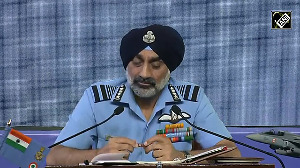Pressing for conclusion of the India-United States civil nuclear agreement during the Bush administration, the US has suggested that it was almost now or never for India to get such a deal, as non-proliferation groups may force additional conditionalities in it.
US Ambassador David Mulford said that the deal was good for India and would make the country the centre of a civil nuclear industry in the world.
"If this is not processed in the present Congress, it is unlikely that this deal will be offered again to India. It certainly would not be revived and offered by any administration, Democratic or Republican, before the year 2010, which is after the life of this administration," he said.
He added that if the deal were to be revived, it would have to go through the (US Congress) Committee process "and I think the non-proliferation groups would insist on changes in many of the terms or additional conditions."
Noting that the 'atmosphere is changing', Mulford said, "I believe and I know both Republicans and Democrats believe in the United States that this is the time to finish this deal."
Asked if it was now or never for the Indo-US civil nuclear deal, Mulford said "That's pretty close to it."
On the political opposition to the deal in this country, Mulford said that the Americans are puzzled as this agreement was not immediately embraced and activated by India.
The Ambassador maintained that India would retain its right to conduct a nuclear test. "India can make that decision (to conduct nuclear tests) at any time. It's a sovereign state, it's very clear that India is free to do as it wishes with regard to future testing," he said.
"It is also clear that if it does conduct a test, then certain things may or may not happen that are prescribed in the agreement. It is all visible there, transparently, for anyone to see," the envoy added.
Asked about the prospects of India getting a waiver from the 45-nation Nuclear Suppliers Group, Mulford expressed confidence but acknowledged that it would not be easy. "We're all hoping for that (a clean and unconditional clearance) but it has to be recognised that this is an extremely sensitive process," he said.
"India has been granted a special exemption by the United States in the global system and we're asking a variety of countries who were not given that particular opportunity to accept a special exemption," he added.
Noting that there are various countries involved, he said some of them take the "view that India is being rewarded inappropriately when it never signed the non-proliferation treaty, while other countries have very strong views on proliferation within their political structures."
So, he said, "that particular process is not going to be easy. I think it's achievable but I think it will take some time and will take some political energy."
"Our opinion is, very strongly, that the NSG will go for a relatively simple consensus and a clean solution to the problem and will not attempt to move beyond the provisions that have been so carefully negotiated in the 123 agreement," Mulford said.
When referred to the difficulties in finalisation of the India-International Atomic Eneregy Agency safeguards agreement, the US ambassador said, "I see no reason why the safeguards agreement can't be achieved. I would be very surprised if that weren't achievable."
India and IAEA have held four rounds of talks on the agreement but failed to firm it up because of differences on various aspects. After the IAEA agreement, India will have to seek a waiver from NSG before a fresh vote in the US Congress.
On fears of the Communist Party of India and the Communist Party of India Marxist, that the US intention behind the deal was to convert India into a subordinate ally in South Asia, he responded: "That's completely untrue. Instead, the United States wants to assist India in achieving its global vision of emerging as a major economic power in the world."
The ambassador said he would be willing to meet CPI-M General Secretary Prakash Karat and try to alleviate his concerns. He also denied that US was pressurising India not to go ahead on the proposed gas pipeline with Iran.
"I don't think that's true at all. What we've done is to indicate to members of the government that we have legislation on our books, which is well-known, which is directed towards discouraging development of natural resources in Iran," he said. This legislation, Mulford said, "has not been used but it is there and it could come into play. We feel its only appropriate to remind people that it's there."





